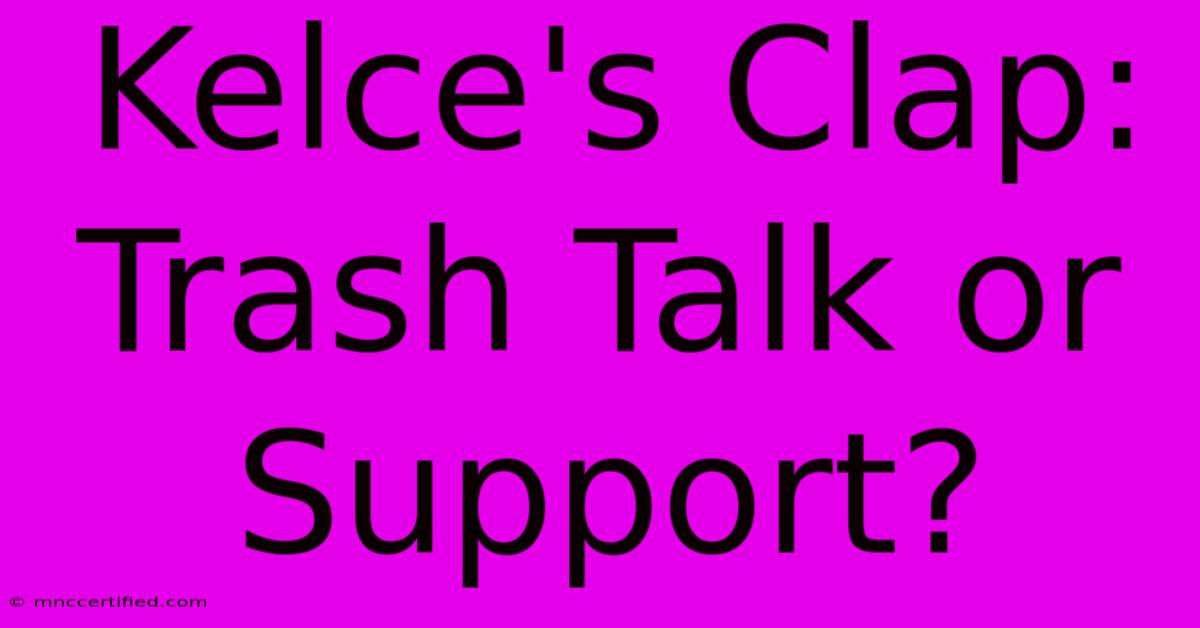Kelce's Clap: Trash Talk Or Support?

Table of Contents
Kelce's Clap: Trash Talk or Support? Decoding the Philadelphia Eagles Tight End's Controversial Celebration
Travis Kelce's on-field demeanor is as captivating as his athletic prowess. Known for his electrifying plays and passionate personality, Kelce often finds himself at the center of post-game discussions, and his signature "clap" is no exception. Is it a show of dominance, a playful jab at opponents, or simply an expression of joy? Let's dive into the complexities of Kelce's clap and dissect its meaning.
Understanding the Context: More Than Just a Clap
The "Kelce clap," a seemingly innocuous gesture, has become a significant talking point among NFL fans and analysts. It's not just a random hand movement; it's often delivered with a specific intensity and timing, making it a key element of his post-play persona. This seemingly simple act, however, carries a multitude of interpretations, depending heavily on the context of the game and the opponent.
The Trash Talk Interpretation: A Subtle Dig at Opponents?
For some, Kelce's clap is a thinly veiled form of trash talk. The timing is often crucial; a resounding clap after a crucial catch or a game-winning play can be perceived as a deliberate taunt directed at the opposing team. This interpretation gains traction when considering Kelce's already established reputation for playful yet competitive banter. His confident demeanor on and off the field further fuels this perspective. It's a silent boast, a subtle way of asserting dominance without needing to utter a single word. Many see it as a psychological game, designed to unsettle opponents and boost team morale.
The Support Interpretation: A Celebration of Team Success
Conversely, many argue that Kelce's clap is a genuine expression of joy and a celebration of team success. It's a spontaneous reaction to a well-executed play, a symbol of shared accomplishment with his teammates. This view emphasizes the collective effort behind every successful drive and points to the clap as a visual representation of team unity and camaraderie. This perspective suggests that any perceived "trash talk" element is incidental, overshadowed by the primary emotion of jubilation.
The Psychology Behind the Clap: Nonverbal Communication in Sports
The ambiguity of Kelce's clap highlights the power of nonverbal communication in sports. Gestures, like body language, can convey emotions and intentions far more effectively than words, sometimes even unintentionally. The interpretation of Kelce's clap hinges on the viewer's perspective, their own biases, and the specific context of the game. This makes it a fascinating case study in how seemingly simple actions can become potent symbols within the competitive landscape of professional sports.
Analyzing the Specific Instances: Context is Key
To truly understand the meaning of Kelce's clap, we must analyze specific instances throughout his career. Did the clap follow a particularly contentious play? Was it directed at a specific player? These contextual factors play a critical role in deciphering the intended message. Some instances might be clear-cut examples of playful ribbing, while others may be simply genuine expressions of excitement. Detailed analysis of game footage, combined with post-game interviews and commentary, is crucial for a nuanced understanding.
Conclusion: The Enduring Mystery of Kelce's Clap
Ultimately, the question of whether Kelce's clap is trash talk or support remains a matter of interpretation. Its ambiguity is precisely what makes it so compelling and memorable. It’s a testament to Kelce's personality and his ability to command attention, both on and off the field. Whether you see it as a subtle dig or a joyous celebration, one thing is certain: the "Kelce clap" has become a symbol in itself, firmly embedding itself in NFL lore. And that, perhaps, is the most significant aspect of its enduring appeal.
Keywords: Travis Kelce, Kelce clap, NFL, trash talk, celebration, sports psychology, nonverbal communication, Philadelphia Eagles, tight end, football, game analysis, post-game analysis, competitive spirit, team spirit, player behavior.

Thank you for visiting our website wich cover about Kelce's Clap: Trash Talk Or Support?. We hope the information provided has been useful to you. Feel free to contact us if you have any questions or need further assistance. See you next time and dont miss to bookmark.
Featured Posts
-
Dune Prophecy Episode 1 Hidden Details
Nov 19, 2024
-
Price Insurance Agency Price Utah
Nov 19, 2024
-
Dune Prophecy Episode Release Dates
Nov 19, 2024
-
Conditional Contract In Insurance
Nov 19, 2024
-
Rhode Island Motorcycle Insurance
Nov 19, 2024